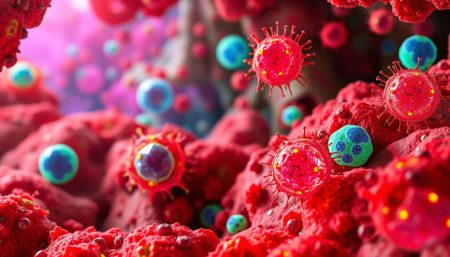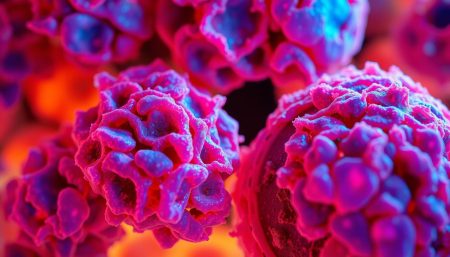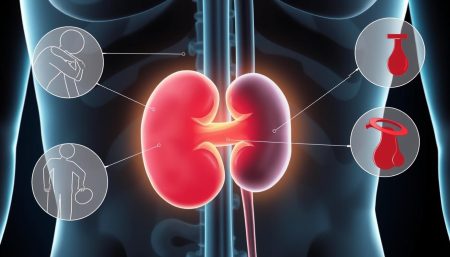Spotting thyroid cancer symptoms early is key to better treatment. This gland in your neck is vital for your body’s functions. If it’s not working right, it will send out signals.
Neck swelling is a common sign. You might see a lump or feel like your throat is full. Voice changes are also important. If your voice gets hoarse or changes pitch without cause, it’s a sign to check.
Other symptoms include trouble swallowing, breathing problems, or unexplained weight changes. These signs don’t always mean cancer, but they shouldn’t be ignored. Knowing about these symptoms helps you take care of your health.
In this guide, we’ll look at the early signs of thyroid cancer. This will help you stay informed and proactive about your health. Remember, catching it early often means better treatment, so listen to your body’s signals.
Understanding Thyroid Cancer and Its Impact
Thyroid cancer is a serious condition that affects the butterfly-shaped gland at the base of your neck. This gland is small but important. It helps control your metabolism, heart rate, and body temperature. When thyroid cells grow abnormally, they can form tumors, leading to thyroid cancer.
What is Thyroid Cancer?
Thyroid cancer happens when thyroid cells mutate and grow out of control. These cells can form masses called thyroid nodules. Some nodules are benign, while others are malignant. It’s important to watch and check nodules for cancer.
Types of Thyroid Cancer
There are several types of thyroid cancer, each with its own characteristics and treatment:
| Type | Description | Prevalence |
|---|---|---|
| Papillary | Most common, slow-growing | 80% of cases |
| Follicular | Second most common, can spread to bones and lungs | 10-15% of cases |
| Medullary | Rare, often hereditary | 2-4% of cases |
| Anaplastic | Rare, aggressive, difficult to treat | 1-2% of cases |
Risk Factors and Prevalence
Thyroid cancer can affect anyone, but some factors increase your risk. These include radiation exposure, family history of thyroid disease, and being female. The number of thyroid cancer cases has been rising, possibly because of better detection methods. Regular check-ups and staying aware of thyroid health are key for early detection and treatment.
Most Common Thyroid Cancer Symptoms
Spotting thyroid cancer symptoms early is key to good treatment. Some signs are subtle, while others are quite clear. Let’s look at the most common signs that might mean you need to see a doctor.
Neck swelling is often the first sign of thyroid cancer. This swelling can look like a lump or nodule in the front of the neck. It might be noticeable when you swallow. Remember, not all neck lumps are cancer, but they should be checked by a doctor.
Difficulty swallowing, or dysphagia, is another warning sign. This symptom can start small but get worse over time. Some people say it feels like food is stuck in their throat.
- Persistent hoarseness or voice changes
- Neck or throat pain
- Swollen lymph nodes in the neck
- Unexplained cough
Other symptoms include breathing problems, feeling full in the neck, and unexplained weight changes. Some people also feel tired or notice changes in their heart rate.
| Symptom | Description | Frequency |
|---|---|---|
| Neck swelling | Visible lump or nodule in front of neck | Very common |
| Difficulty swallowing | Feeling of food stuck in throat | Common |
| Voice changes | Persistent hoarseness | Common |
| Breathing issues | Shortness of breath, specially when lying down | Less common |
If you notice any of these symptoms, like neck swelling or trouble swallowing, see your doctor right away. Early detection can greatly improve treatment results.
Recognizing Neck Swelling and Lumps
Neck swelling can be a sign of many health issues, including thyroid cancer. It’s important to know the signs of suspicious thyroid nodules for early detection and treatment.
Characteristics of Suspicious Thyroid Nodules
Thyroid nodules are growths in the thyroid gland. While most are harmless, some signs may point to cancer:
- Firm or hard texture
- Fixed position when swallowing
- Rapid growth
- Single nodule instead of multiple
- Larger than 1 cm in diameter
When to Be Concerned About Neck Swelling
Neck swelling needs medical attention if it:
– Lasts more than two weeks
– Comes with voice changes or trouble swallowing
– Causes pain or discomfort
– Grows quickly
Difference Between Benign and Malignant Lumps
Telling benign from malignant lumps is hard without a doctor’s help. Here’s a quick comparison:
| Characteristic | Benign Lumps | Malignant Lumps |
|---|---|---|
| Texture | Soft, movable | Hard, fixed |
| Growth Rate | Slow | Rapid |
| Pain | Usually painless | May be painful |
| Borders | Smooth, well-defined | Irregular, poorly defined |
Only a healthcare professional can truly diagnose thyroid nodules or neck swelling. If you see any unusual changes, get medical advice right away.
Voice Changes and Hoarseness as Warning Signs
Thyroid cancer symptoms can show up in unexpected ways. Voice changes are often missed. A persistent hoarse voice or changes in how you sound might mean more than a cold or laryngitis. This happens when thyroid tumors grow big enough to touch the nerves that control your vocal cords.
Watch out for these vocal warning signs:
- Ongoing hoarseness lasting over two weeks
- Difficulty hitting high notes or changes in pitch
- A constant feeling of having to clear your throat
- Vocal fatigue or strain when speaking
If you notice any of these signs, see a doctor right away. Voice changes don’t always mean thyroid cancer. But, they need to be checked out, even more so if you have other symptoms like neck swelling or trouble swallowing.
Early detection is key to good treatment results. Don’t ignore persistent voice changes. Listen to your body and get medical help if you notice unusual vocal symptoms. Your voice is key for talking, and taking care of it is important for your health.
Swallowing Difficulties and Related Issues
Difficulty swallowing is a major symptom of thyroid cancer. It can really change how you live your day-to-day life. When thyroid tumors grow, they can put pressure on the esophagus. This makes it hard to eat and drink.
Types of Swallowing Problems
There are different kinds of swallowing issues with thyroid cancer. Some people feel like food is stuck in their throat. Others might feel pain when they swallow. In bad cases, it’s hard to swallow liquids or even spit.
Associated Throat Discomfort
Throat discomfort often goes along with swallowing problems. You might feel constant pressure, soreness, or a lump in your neck. These feelings can get worse as the tumor grows.
Impact on Daily Life
Swallowing issues can really mess up your life. Eating becomes a hard task instead of a joy. You might avoid certain foods to avoid discomfort. This can make social meals stressful.
It can also lead to weight loss because you eat less. Spotting these symptoms early and getting medical help is key. It helps catch thyroid cancer early and start treatment.
Understanding Thyroid Nodules
Thyroid nodules are lumps in the thyroid gland. They can be different sizes and may be solid or filled with fluid. Some nodules are cancerous, so it’s key to know about their risks.
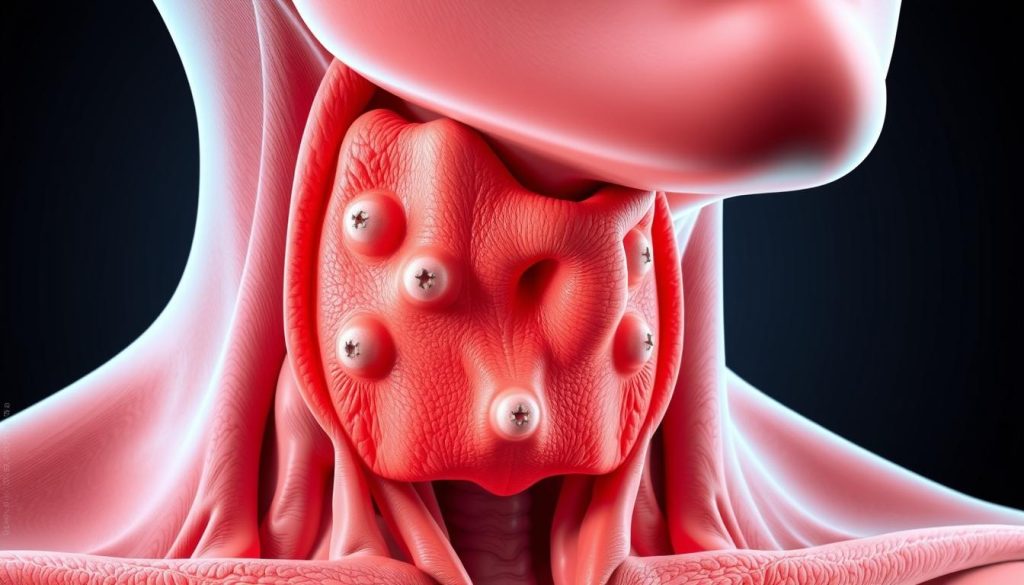
Neck swelling is often the first sign of thyroid nodules. But, many nodules are too small to feel. They are found during medical exams or tests. Thyroid cancer can arise from these, though most are not cancerous.
Doctors sort thyroid nodules by their features:
- Size: Ranging from microscopic to several centimeters
- Composition: Solid, cystic, or mixed
- Function: Producing thyroid hormones or not
- Appearance: Single nodule or multiple nodules
Risk factors for thyroid nodules include:
| Risk Factor | Description |
|---|---|
| Age | More common in older adults |
| Gender | Women are more likely to develop nodules |
| Radiation exposure | Increases risk, specially in childhood |
| Iodine deficiency | Can lead to thyroid enlargement and nodules |
If you notice neck swelling or have thyroid nodule concerns, see your doctor. They can do tests to see if you need more checks or treatment.
Persistent Cough and Breathing Changes
A nagging cough or changes in breathing can signal health problems, like thyroid cancer. It’s important to know the difference between normal and serious signs. This helps catch issues early.
Spotting Suspicious Coughs
Not every cough is a worry. But, a cough that lasts more than three weeks needs checking. If you also notice neck swelling or voice changes, see a doctor.
Breathing Pattern Changes
Thyroid cancer can impact breathing. Look out for:
- Shortness of breath
- Wheezing
- Difficulty breathing when lying down
These changes might happen slowly. Keep track of any odd breathing and talk to your doctor. While these signs can hint at thyroid cancer, they often point to milder issues. Regular visits and talking openly with your doctor are vital for your health.
Weight Changes and Metabolic Symptoms
Thyroid cancer can mess with how our bodies work, causing unexpected weight changes. These changes happen because the thyroid controls how we burn energy. Spotting these signs early is important for catching thyroid cancer.
One common sign of thyroid cancer is unexplained weight loss. This happens when our metabolism goes too fast, burning calories quicker. Some people might lose weight even when they eat the same or more than usual. On the other hand, weight gain can also be a sign, usually when the thyroid doesn’t work right.
Other metabolic changes to watch for include:
- Increased appetite without weight gain
- Sudden changes in energy levels
- Difficulty regulating body temperature
- Unexplained muscle weakness
If you notice any of these symptoms, like unexplained weight loss, see a doctor right away. They can run tests to find out why and suggest what to do next.
| Symptom | Possible Cause | Action |
|---|---|---|
| Unexplained weight loss | Overactive thyroid due to cancer | Consult doctor for thyroid function tests |
| Sudden weight gain | Underactive thyroid due to cancer | Seek medical evaluation |
| Increased appetite with weight loss | Metabolic imbalance from thyroid issues | Schedule a thorough health check |
Fatigue and Energy Level Changes
Fatigue is a common symptom of thyroid cancer. It can change how much energy you have every day. Knowing about the different types of fatigue can help find and treat it early.
Types of Fatigue
Thyroid cancer can cause different kinds of fatigue:
- Physical exhaustion: Feeling very tired after doing little
- Mental fog: Trouble focusing or remembering things
- Emotional fatigue: Feeling overwhelmed or lacking motivation
Impact on Daily Activities
Fatigue can make everyday life hard. Even simple tasks feel like a lot. It can also hurt your work and make it hard to do things you love.
Associated Symptoms
Other symptoms of thyroid cancer include:
| Symptom | Description |
|---|---|
| Sleep disturbances | Insomnia or sleeping too much |
| Mood changes | Irritability or feeling sad |
| Weight fluctuations | Unexplained weight gain or loss |
| Temperature sensitivity | Feeling too hot or cold |
If you’re always tired and have these symptoms, see a doctor. Finding thyroid cancer early can help you get better faster.
Rapid Heartbeat and Cardiovascular Signs
Thyroid cancer can impact the heart. It’s key to understand how thyroid cancer symptoms and heart changes are linked. This knowledge helps in early detection and treatment.
A rapid heartbeat, or tachycardia, is a symptom of thyroid cancer. It happens when the heart beats too fast, even when you’re resting. Some people might feel their heart racing or pounding in their chest.
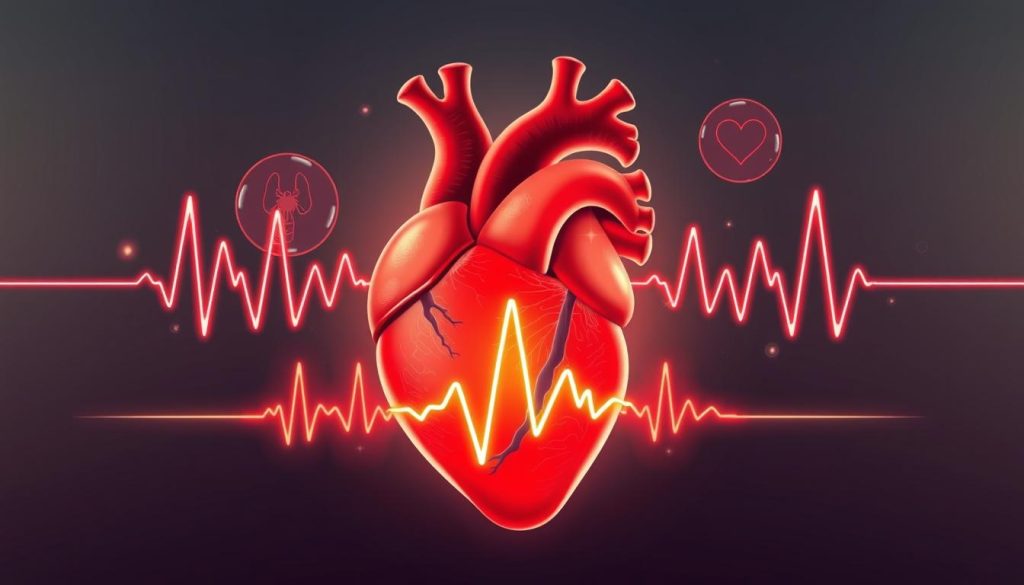
- Irregular heartbeats or palpitations
- Shortness of breath
- Chest pain or discomfort
- Dizziness or lightheadedness
These symptoms can be due to many conditions, not just thyroid cancer. If you have a persistent rapid heartbeat or other heart issues, see your doctor. They can check what’s causing it.
| Symptom | Description | When to Seek Medical Attention |
|---|---|---|
| Rapid Heartbeat | Heart rate above 100 beats per minute at rest | If persistent or accompanied by other symptoms |
| Palpitations | Sensation of heart fluttering or skipping beats | If frequent or causing distress |
| Shortness of Breath | Difficulty breathing, even during light activities | If sudden or getting worse over time |
Early detection of thyroid cancer symptoms, including heart issues, is vital. It leads to better treatment results. Regular health checks and talking openly with your doctor are key to staying healthy.
Early Detection Methods and Screening
Catching thyroid cancer symptoms early is key to success. Spotting signs and regular check-ups are important. Let’s look at ways to keep your thyroid healthy.
Self-Examination Techniques
You can check for neck swelling at home. Stand in front of a mirror and tilt your head back slightly. Look for any lumps or bumps as you swallow.
Gently feel your neck for any unusual growths. If you notice anything odd, don’t panic, but do see a doctor.
Professional Screening Options
Doctors use several tests to screen for thyroid cancer:
- Physical exam: Your doctor feels your neck for lumps
- Blood tests: These check your thyroid hormone levels
- Ultrasound: This imaging test can spot small nodules
- Fine-needle aspiration: A tiny sample is taken from a suspicious lump
Regular Check-up Importance
Yearly check-ups are very important. They help catch thyroid cancer symptoms early. Your doctor can track changes and spot issues early.
Don’t skip these visits, even if you feel fine. Early detection can lead to better outcomes and easier treatments.
Risk Factors for Thyroid Cancer
Knowing the risk factors for thyroid cancer can help you understand your chances. Some risks are out of our control, but we can manage others through lifestyle choices.
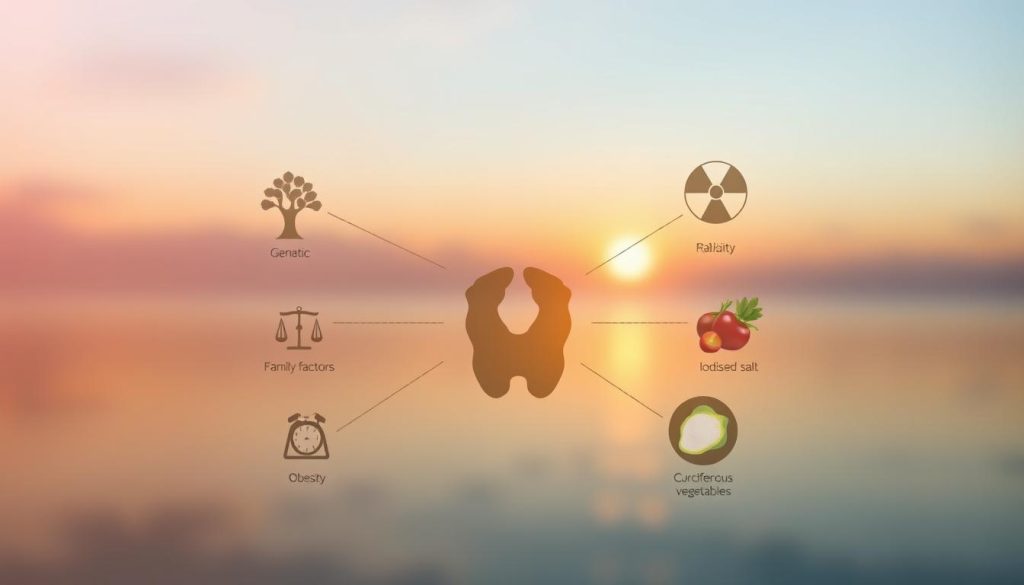
Genetics play a big role in thyroid cancer risk. If your family has a history of thyroid cancer or certain genetic syndromes, your risk goes up. Exposure to radiation is another environmental factor that can raise your risk.
Age and gender also matter. Women are more likely to get thyroid cancer than men, and the risk grows with age. But, thyroid cancer can happen to anyone, regardless of age.
| Risk Factor | Impact on Thyroid Cancer Risk |
|---|---|
| Family history | Significantly increases risk |
| Radiation exposure | Elevates risk, specially in childhood |
| Gender (Female) | Higher risk compared to males |
| Age (Over 40) | Increased risk with advancing age |
| Iodine deficiency | May contribute to risk in some cases |
Lifestyle choices can also affect your risk. Eating a healthy diet full of iodine and avoiding too much radiation are good steps. Regular health checks and thyroid exams are key for catching cancer early.
When to Seek Medical Attention
Spotting thyroid cancer symptoms early can improve treatment results. It’s important to know when to see a doctor for thyroid problems.
Emergency Warning Signs
Some thyroid cancer symptoms need quick medical help. These include:
- Severe neck swelling
- Difficulty breathing
- Sudden voice changes
- Unexplained, rapid weight loss
If you notice any of these signs, act fast. Get medical help right away.
Preparing for Doctor’s Visit
Getting ready for a doctor’s visit is important. Here’s how to prepare:
- Write down all symptoms, even those that seem unrelated
- List medications, vitamins, and supplements you’re taking
- Bring recent test results if available
- Prepare questions about your symptoms and possible tests
Early detection is key. If you notice ongoing changes in your neck or thyroid, don’t delay. Seek medical attention right away. Your doctor can run tests to check for thyroid cancer and provide timely care if needed.
| Symptom | Action |
|---|---|
| Persistent neck lump | Schedule doctor’s appointment |
| Sudden difficulty swallowing | Seek immediate medical care |
| Gradual voice changes | Consult ENT specialist |
| Unexplained weight fluctuations | Discuss with primary care physician |
Diagnostic Procedures and Tests
Doctors use many methods to diagnose thyroid cancer. They start with a physical exam to check for lumps or swelling in your neck. Blood tests also check your thyroid hormone levels, which can be different in some cancers.
Imaging is key in finding thyroid cancer. Ultrasound is often the first step, using sound waves to see your thyroid gland clearly. It helps find the size and location of any nodules. If something looks odd, a fine-needle aspiration biopsy might be suggested. This takes a small sample of cells for a closer look.
More scans like CT or MRI might be needed for a full view. These tests help see if the cancer has spread. Genetic testing is also used, mainly for hereditary thyroid cancers. Each test gives important info, helping your team make the right diagnosis and treatment plan for you.
FAQ
Q: What are the most common symptoms of thyroid cancer?
A: Common symptoms include neck swelling and voice changes. You might also have trouble swallowing or coughing a lot. Other signs are unexplained weight loss, feeling very tired, and a fast heartbeat. Remember, these symptoms can also mean other health issues, so getting checked by a doctor is key.
Q: How can I differentiate between benign and malignant thyroid nodules?
A: It’s hard to tell without medical tests. But, fast-growing, firm, or stuck nodules might be a sign of cancer. Only a doctor can say for sure with tests and exams.
Q: When should I be concerned about neck swelling?
A: Be worried if neck swelling lasts over two weeks. It should be painless, firm, or hard. Also, watch for voice changes or swallowing trouble. Always talk to a doctor if your neck looks or feels off.
Q: Can thyroid cancer cause voice changes?
A: Yes, it can. Growing tumors might press on vocal cord nerves. This can make your voice hoarse, deeper, or hard to use. See a doctor if your voice changes last more than two weeks.
Q: How does thyroid cancer affect swallowing?
A: It can make swallowing hard. The tumor might press on the esophagus. You might feel like something’s stuck or have swallowing pain. If swallowing is hard for you, see a doctor.
Q: What are the risk factors for developing thyroid cancer?
A: Risk factors include radiation exposure and family history. Being female and older also increases risk. But, having a risk factor doesn’t mean you’ll get cancer.
Q: How is thyroid cancer diagnosed?
A: Doctors use exams, imaging tests, and biopsies to diagnose. Blood tests check thyroid function. More tests might be needed to confirm or see how far the cancer has spread.
Q: Can thyroid cancer be detected through self-examination?
A: Self-exams can help you know your neck. Look in a mirror and feel for lumps. But, many cancers are too small to find this way. Regular doctor visits are important.
Q: How often should I get screened for thyroid cancer?
A: There’s no one-size-fits-all screening rule. If you’re at risk or have a family history, your doctor might suggest more checks. It’s good to have your thyroid checked during routine physicals and talk to your doctor about any worries.
Q: What should I do if I suspect I have thyroid cancer symptoms?
A: If you think you have symptoms, see your doctor right away. Write down your symptoms and when they started. If symptoms are severe or suddenly get worse, get help fast.













